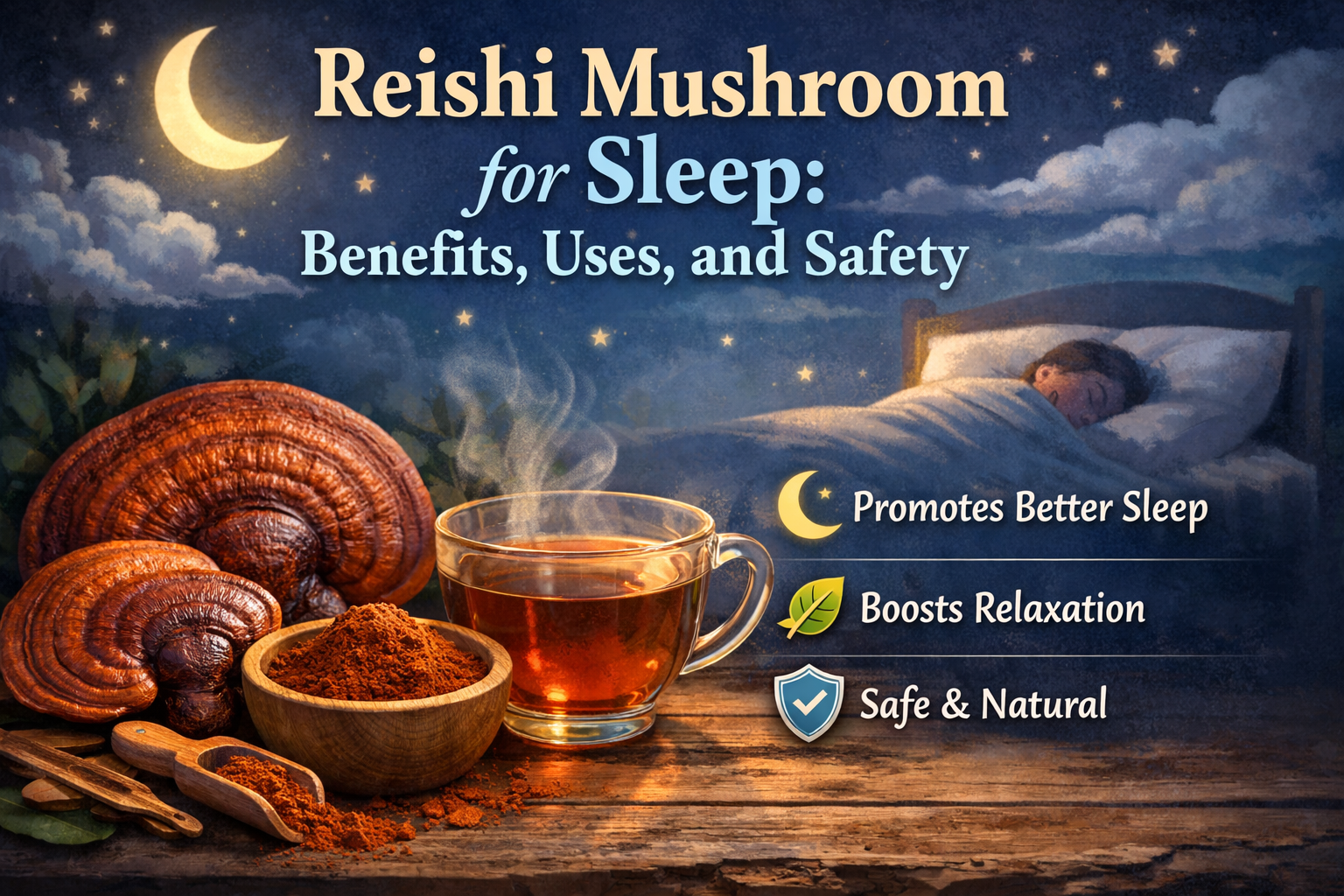Sleep is one of the quiet foundations of health, yet it is often the first thing sacrificed when life feels demanding. Many health-conscious people want deeper, more consistent rest but feel wary of prescription sedatives or waking up groggy from over-the-counter pills. This is where glycine for sleep enters the conversation.
Glycine is a simple amino acid with surprisingly far-reaching effects in the brain and body. When used intentionally, glycine for sleep may help you fall asleep faster, deepen rest, and feel more refreshed the next day—without sedating you or dulling your mind.
“Sleep is the single most effective thing we can do to reset our brain and body health each day.”
— Matthew Walker, PhD, professor of neuroscience and psychology
This guide explores how glycine for sleep works, what the research actually shows, how to use it thoughtfully, and when it might (or might not) be the right choice for you.
What Is Glycine?

Glycine is a non-essential amino acid, meaning your body can make it, and you also get it from food. Despite its simplicity, it participates in a overall well-being of processes:
-
Protein building block: Glycine is a major component of collagen, which supports skin, bones, joints, tendons, and ligaments.
-
Detox and antioxidant support: It helps form glutathione, one of the body’s main antioxidants.
-
Energy and muscle function: Glycine is a precursor to creatine, which supports muscle energy.
-
Genetic material: It contributes to the synthesis of DNA and RNA.
You naturally consume about 3–5 grams of glycine per day from protein-rich foods such as:
-
Meat and poultry
-
Fish
-
Dairy products
-
Beans, peas, and lentils
Many people also get extra glycine from collagen-rich foods like bone broth or gelatin-containing dishes. What makes glycine for sleep especially interesting is that this same simple amino acid also acts as a neurotransmitter in the brain, influencing how your nervous system shifts between wakefulness and rest.
Why People Turn To Glycine For Sleep
Many people are drawn to glycine for sleep because it offers:
-
A non-pharmaceutical approach that aligns with a more natural, long-term strategy
-
Support for sleep without strong sedation
-
Potential benefits for daytime alertness instead of morning grogginess
Unlike many sleep medications, glycine does not “knock you out.” Instead, glycine for sleep appears to help the brain and body move into a state that is more compatible with natural sleep: cooler body temperature, calmer nervous system, and more stable sleep stages.
For stressed professionals and wellness-focused individuals, glycine for sleep can fit into a broader routine that includes consistent bedtimes, a dark bedroom, reduced evening screen exposure, and other sleep-supportive habits. Parents of young children, shift workers, and frequent travelers may also be interested in this gentle amino acid as part of a bigger sleep strategy.
How Glycine For Sleep Works In The Body
The effects of glycine for sleep are tied to several interconnected mechanisms rather than a single sedative action, including the mechanisms of magnesium in sleep disorders which share similar pathways with glycine's sleep-promoting effects.
Thermoregulation: Lowering Core Body Temperature

Falling asleep is closely tied to a gentle drop in core body temperature. Glycine appears to support this process by:
-
Increasing blood flow to the skin (peripheral vasodilation)
-
Allowing more heat to leave the body’s core
-
Supporting the natural nighttime cooling that signals “it’s time to sleep”
Animal studies show that oral glycine produces a mild, controlled drop in core body temperature. This change lines up with shorter sleep onset—the time it takes to fall asleep—suggesting that this cooling effect is part of why glycine for sleep can be helpful.
This is similar to what happens after a warm bath before bed: your skin warms, heat leaves your core, and your body reads the shift as a cue for sleep.
The Suprachiasmatic Nucleus (SCN) And The Body’s Clock
Deep in the brain, the suprachiasmatic nucleus (SCN) acts as the body’s “master clock,” coordinating circadian rhythms—including sleep-wake cycles and daily temperature fluctuations.
Research suggests that:
-
Supplemental glycine crosses the blood–brain barrier.
-
It acts on NMDA (N-methyl-D-aspartate) receptors in the SCN.
-
This activation appears to trigger the sequence that increases skin blood flow and lowers core temperature.
In animal experiments where the SCN was damaged, the sleep- and temperature-related effects of glycine disappeared. This points to the SCN as a key site of action for glycine for sleep.
Neurotransmitters: Glycine, NMDA Receptors, And Serotonin
Glycine has a dual role in the nervous system:
-
Inhibitory neurotransmitter in the brainstem and spinal cord, where it helps calm motor activity and contributes to muscle relaxation during REM sleep.
-
Co-agonist at NMDA receptors in other brain regions, where it works with glutamate to modulate learning, memory, and circadian signaling.
For glycine for sleep, NMDA receptor activation in the SCN seems central. Pharmacological studies show that:
-
Blocking NMDA receptors prevents glycine’s temperature-lowering effects.
-
Blocking glycine’s inhibitory receptors (with strychnine) does not.
There is also evidence from animal studies that oral glycine can raise serotonin levels in the prefrontal cortex. Serotonin is:
-
Involved in mood and sleep regulation
-
A precursor to melatonin, the hormone that signals nighttime to the body
Together, these findings suggest that glycine to get to sleep works by gently shifting the body toward its nighttime mode—cooler, calmer, and more synchronized with internal rhythms—rather than by bluntly sedating the brain.
What The Research Says About Glycine For Sleep
The evidence for glycine for sleep comes from both animal research and small human trials.
Animal Studies
In sleep-disturbed rats, oral glycine has been shown to:
-
Increase time spent in non-REM (NREM) sleep
-
Shorten the time it takes to enter NREM sleep
-
Reduce time spent awake shortly after dosing
-
Consistently lower core body temperature
These findings support the idea that glycine for sleep promotes a quicker shift into restorative sleep while aligning body temperature with nighttime physiology.
Human Studies
Human research is more limited but encouraging, with recent studies including a randomized, placebo-controlled trial examining magnesium bisglycinate supplementation in healthy adults reporting poor sleep:
-
Dose: Most trials used 3 grams of glycine taken before bedtime.
-
Subjective sleep quality: Participants with insomnia tendencies reported better overall sleep satisfaction and feeling more rested in the morning.
-
Objective sleep measures: Polysomnography (sleep lab testing) showed:
-
Shorter time to fall asleep
-
Faster entry into slow-wave (deep) sleep
-
More stable sleep without major disruption of normal sleep stages
-
-
Daytime function: In partially sleep-deprived volunteers, glycine for sleep was associated with:
-
Less daytime sleepiness
-
Less fatigue
-
Improved performance on cognitive tasks
-
Most human studies so far have been short-term and involved relatively small groups of adults. One important caveat is that some of these studies involved researchers affiliated with companies that sell glycine supplements, and sample sizes were small. While the pattern of results is consistent, larger independent trials are still needed to better define how effective glycine for sleep is across different groups.
Benefits You May Notice With Glycine For Sleep

Based on current evidence and user reports, people who try glycine for sleep often describe:
-
Falling asleep faster
The drop in core temperature and shift in circadian signaling may reduce the tossing-and-turning phase at the beginning of the night. -
Deeper, more restorative sleep
Studies show quicker entry into slow-wave sleep, which is linked to physical repair, immune support, and memory consolidation. -
More stable sleep through the night
Glycine appears to support a more consistent sleep state with fewer brief awakenings for some people. -
Less morning grogginess
Unlike sedative drugs that can linger into the morning, glycine for sleep typically does not cause a “hangover” effect. Many people report feeling clearer and more restful sleep upon waking. -
Better next-day focus and energy
In sleep-restriction studies, glycine users reported less fatigue and performed better on mental tasks, suggesting that improved sleep carried into daytime function.
Individual responses vary, and glycine for sleep is not a cure-all. But for many, it acts as a gentle nudge toward the kind of sleep the body is already trying to create.
How To Take Glycine For Sleep

If you decide to experiment with glycine for sleep, thoughtful dosing and timing matter.
Recommended Dosage And Timing
Human studies that reported benefits generally used specific dosing protocols, with recent research on glycinate bioavailability providing insights into optimal absorption and timing:
|
Purpose |
Typical Amount |
Timing |
|---|---|---|
|
Sleep Support (Research) |
3 grams |
30–60 minutes before bedtime |
Practical guidelines:
-
Start with 1–2 grams to assess how you feel.
-
If tolerated, increase to 3 grams in the evening, which is the most studied dose for glycine for sleep.
-
Take it about 30–60 minutes before bed, giving your body time to absorb and respond.
Forms Of Glycine
You can use glycine for sleep in different supplement forms:
-
Powder:
-
Slightly sweet taste
-
Easy to dissolve in water or herbal tea
-
Simple to measure out a 3-gram dose with a kitchen scale or measuring spoon (if provided)
-
-
Capsules or tablets:
-
Convenient for travel or the office
-
Often 500–1,000 mg per capsule
-
You may need 3–6 capsules to reach 3 grams
-
Some people like to mix powdered glycine into a small glass of water or a warm, non-caffeinated drink as part of a calming pre-bed ritual. Check the supplement label for serving size and total milligrams per dose so you can match the amounts used in studies on glycine for sleep.
Supporting Glycine With Good Sleep Habits

No supplement can fully compensate for habits that conflict with good sleep is essential. To get the most from glycine to stay asleep, pair it with:
-
A consistent bedtime and wake time
-
A dark, quiet, cool bedroom
-
Reduced screen exposure and bright light in the hour before sleep
-
Limiting caffeine later in the day and heavy meals late at night
Think of glycine for sleep as one supportive piece of a larger pattern that favors rest.
Safety, Side Effects, And Quality Considerations
For most healthy adults, glycine for sleep has a reassuring safety profile at typical doses.
General Safety
-
In human sleep studies, 3 grams before bed did not produce significant side effects.
-
Higher daily doses (up to 31 grams) have been used in other clinical contexts with overall good tolerance, though those amounts are not recommended for sleep.
Glycine is also classified by the U.S. Food and Drug Administration as generally recognized as safe (GRAS) when used as a food ingredient. Even so, more is not always better. Stick to the 3-gram range for glycine for sleep, unless a qualified healthcare professional advises otherwise.
Possible Side Effects
Side effects are uncommon at sleep-related doses but may include, especially at much higher intakes:
-
Mild nausea
-
Upset stomach or loose stools
If you experience discomfort, lower the dose or stop and speak with a healthcare provider.
Supplement Regulation And Quality
In the US, glycine is sold as a dietary supplement. That means:
-
The FDA does not review supplements for safety or effectiveness before they reach the market.
-
Quality and purity can vary widely between brands.
When choosing glycine for sleep, look for:
-
Third-party testing or certifications (e.g., NSF, USP, ConsumerLab)
-
Clear labeling of dose per serving
-
Transparent ingredient lists without unnecessary additives
Who Should Be Cautious With Glycine For Sleep
Check with a healthcare professional before using glycine for sleep if you:
-
Are pregnant or breastfeeding
-
Have kidney or liver disease
-
Take prescription medications (especially those affecting the brain, mood, or metabolism)
-
Have been advised to limit protein or specific amino acids
A brief conversation with your clinician can help you decide whether glycine for sleep fits safely into your overall plan.
Other Potential Health Benefits Of Glycine
While this guide focuses on glycine for sleep, this amino acid also plays roles throughout the body that may support broader well-being:
-
Liver and detox support:
Glycine helps form glutathione and certain bile acids, both involved in detoxification and protection of liver cells. -
Skin, bones, and joints:
As a major component of collagen, glycine contributes to connective tissue structure, which may help support joint comfort and skin integrity sleep and longevity. -
Nervous system and mental health:
High-dose glycine has been studied as an add-on treatment in sleep and mental health, targeting NMDA receptors. Some people also report a calming effect at lower doses, which may complement the relaxing aspect of glycine for sleep. -
Metabolic health (early research):
Lower blood levels of glycine have been linked with metabolic concerns such as insulin resistance, though it is not clear yet whether supplementation can change long-term outcomes.
These areas are still under investigation, but they underscore that glycine is woven into many of the body’s basic systems.
Frequently Asked Questions About Glycine For Sleep
Is Glycine Safe To Take For Sleep?
For most healthy adults, glycine for sleep at around 3 grams taken before bed appears safe and well-tolerated in studies. However, safety depends on your personal health context. If you have medical conditions, take medications, or are pregnant or breastfeeding, talk with your healthcare provider before starting glycine for sleep.
How Long Does It Take For Glycine To Work For Sleep?
In research, participants typically took 3 grams of glycine 30–60 minutes before bedtime. Many reported feeling a difference that same night, especially in how quickly they fell asleep or how refreshed they felt the next morning. As with many supplements, some people may notice benefits quickly, while others may need several nights of consistent use before changes feel clear.
Can I Take Glycine For Sleep Long-Term?
Current evidence suggests that glycine for sleep does not cause dependence or tolerance at standard doses. Studies and clinical use in other settings, often at higher doses, have generally shown good long-term safety. Even so, it is wise to:
-
Check in periodically with your healthcare provider
-
Revisit whether glycine for sleep is still serving your goals
-
Continue to address underlying stress, schedule, and lifestyle patterns contributing to sleep issues
Will Glycine Interact With My Medications?
Glycine has relatively few well-documented interactions, but any compound that affects the brain or metabolism has the potential to interact with certain medications. Because of this, it is important to review glycine for sleep with your physician or pharmacist if you are on:
-
Psychiatric medications
-
Sleep medications or sedatives
-
Anti-seizure drugs
-
Medications for serious medical conditions
They can help you assess risk in the context of your specific regimen.
Can Glycine Treat Insomnia Or Sleep Apnea On Its Own?
Glycine for sleep may help ease insomnia symptoms—particularly difficulty falling asleep and feeling unrefreshed—but it is not a stand-alone treatment for diagnosed sleep disorders. For chronic insomnia, cognitive behavioral therapy for insomnia (CBT-I) is considered a leading natural solution. For sleep apnea, addressing airway obstruction with appropriate therapies is essential.
Think of glycine for sleep as a possible supportive tool, not a replacement for thorough evaluation and treatment of serious sleep issues.
When Glycine For Sleep Might Not Be Enough
If you find yourself relying on glycine for sleep but still:
-
Wake up gasping or choking
-
Snore loudly and feel exhausted despite a full night in bed
-
Lie awake for hours with racing thoughts most nights
-
Need stimulants to function every day
then it is important to look beyond supplements. These patterns may signal conditions such as sleep apnea, chronic insomnia, anxiety, depression, or other medical issues that warrant professional care.
In those situations, glycine for sleep may still have a place, but only as part of a more comprehensive approach guided by a qualified clinician.
Putting It All Together
Glycine is a small molecule with a quiet but meaningful presence throughout the body. Used intentionally, glycine for sleep offers a gentle way to align your biology with the natural rhythms of night: cooler core temperature, calmer nervous system, and smoother transitions into deep, restorative rest.
It is not a magic solution, and the research—while promising—is still developing. But for many health-conscious people searching for a calmer alternative to heavy sleep medications, glycine for sleep can be a thoughtful experiment:
-
Start low, aim for around 3 grams before bed if tolerated.
-
Pair it with consistent, sleep-supportive habits.
-
Pay close attention to how you feel at night and the next day.
-
Stay in conversation with your healthcare provider.
Sleep is one of the most direct ways the body repairs, integrates, and makes sense of experience. If glycine for sleep helps you access that state more readily and wake with a clearer mind, it may become a quiet but meaningful part of your nightly ritual.



Leave a comment
This site is protected by hCaptcha and the hCaptcha Privacy Policy and Terms of Service apply.